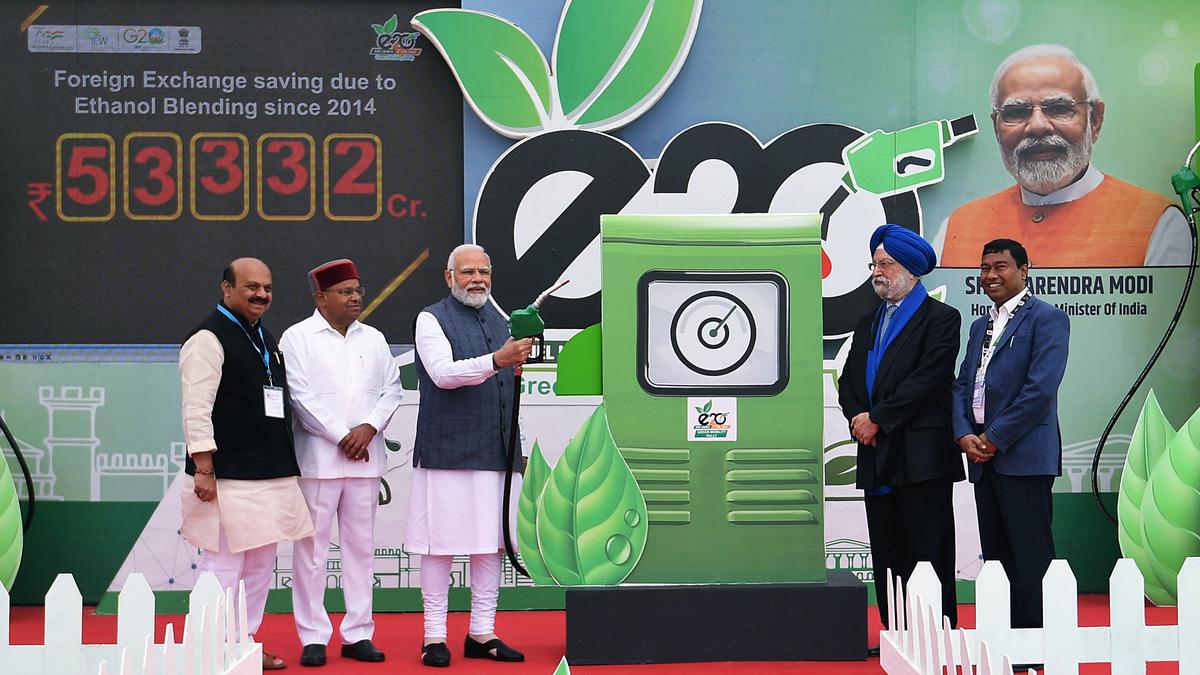The government aims to achieve a complete 20% blending of ethanol by 2025-2026.
New Delhi: With India officially rolling out the retail distribution of E20 fuel—a blend of 20% ethanol and 80% petrol—industry has mounted brisk efforts to partner the Centre in fulfilling its strong commitment towards achievement of 20% ethanol blending target—advanced to fiscal 2025 from fiscal 2030—and lowering India’s emissions to net-zero by 2070. As part of the phased roll-out of E20, oil marketing companies sell petrol blended with 10% ethanol at present—up from 1.5% blending in petrol in 2014. The government aims to achieve a complete 20% blending of ethanol by 2025-2026 and in line with the phased roadmap, the project has started with E20 fuel being made available at 84 retail outlets of OMCs in 11 states/UTs.
According to a Confederation of Indian Industry- CRISIL Market Intelligence report, the achievements over the last eight years under the Ethanol Blending Programme & Biofuels Programme including the 10% blending of ethanol five months ahead of the target, has helped the country in reduction of 318 lakh metric tonnes of CO2 emissions and foreign exchange savings of around Rs 54,000 crore. Going ahead, if India is able to implement 20% ethanol blending in petrol by 2025-26, this is expected to substitute 86 million barrels of gasoline, thereby leading to forex savings of Rs 30,000 crore for India, as well as reducing 10 million tons of carbon emissions.
The E20 rollout comes more than two months ahead of the Centre’s initial rollout plan for April and amidst India’s G20 Presidency as it looks to expanding the availability of the E20 fuel throughout the country in partnership with Indian companies which are lining up to support the Government’s directive on E20 fuel and their own net-zero ambitions. The important timelines decided for pan India implementation of E-20 are 2023 for vehicles to be material compliant, and 2025 for vehicles to be fully E-20 compliant.
While Indian Oil Corporation outlets will provide Bengaluru and 14 other cities across India with E20 fuel in the first phase, Jio-BP which is a joint venture between Reliance Industries and British Petroleum, has offered customers with E20 petrol compatible vehicles to opt for this fuel at select Jio-BP outlets. A key enabler for the JV will be Reliance’s large presence and deep experience in consumer businesses across India as well as BP’s global experience in high-quality differentiated fuels, lubricants, convenience and advanced low carbon mobility solutions.
To step up the momentum, OMCs are setting up 2G-3G ethanol plants that will facilitate the progress. Indian Oil Corporation’s 2nd generation (2G) ethanol plant in Panipat built at an estimated cost of over Rs 900 crore close to the Panipat Refinery is set to usher in a new chapter in the waste-to-wealth conversion by utilising about 2 lakh tonnes of rice straw (parali) annually to generate around 3 crore litres of ethanol annually. With this plant the Government is eyeing phase out of about three lakh tonnes of carbon dioxide equivalent emissions per year with reduction in burning of rice straw (parali) which may be equivalent to replacing nearly 63,000 cars annually on the country’s roads.
The auto industry is taking a lead on the E20 initiative by bringing in technologies and vehicles which are material compliant to the fuel standards with Tata Motors on Saturday introducing a Bharat Stage 6 Phase II range of passenger vehicles which have E20-compliant engines. The engines are available across the models including Altroz, Punch, Nexon, Tiago and Tigor and are also in compliance with the second phase of BS6 emission norms which will come into effect from 1 April, 2023. Hyundai Motor India’s new Grand i10 NIOS car also offers three E20 fuel ready engine options. The company has also updated its CRETA midsize SUV with the petrol engine version now E20 compliant. This basically means that the SUV can now run on 20 per cent ethanol blended fuel.
Like Brazil where flex-fuel (E100)*1 motorcycle models are already available, Honda Motorcycle and Scooter India plans to introduce flex-fuel E20 models beginning in 2023 and flex-fuel E100 models in 2025. According to Vinod Aggarwal, President of the Society of Indian Automobile Manufacturers, CEO & MD, Volvo Eicher Commercial Vehicles, the industry is now aligned for rolling out E20 material-compliant vehicles and production of E20-tuned vehicles. The auto industry body which has been mandated to promote ethanol as a transportation fuel, will be promoting higher ethanol blends in the Indian gasoline mix and observe its impact on the automobile industry under an agreement with the US Grains Council.
The goal of 20 per cent ethanol in gasoline would also benefit the country’s agricultural industry as India’s ethanol blending programme comprises procurement of ethanol produced directly from B-heavy molasses, sugarcane juice and damaged food grains. The country’s current ethanol production capacity for ethanol blending with petrol and other uses is about 947 crore litres (includes 619 crore litres of molasses-based production capacity and 328 crore litres of grain-based production capacity). According to Tarun Sawhney, Vice Chairman and Managing Director of Triveni Engineering and Industries, the, impact that this move will have in enhancing farm incomes for sugarcane and grain farmers is significant. According to Shishir Joshipura, CEO and MD, Praj Industries, besides bolstering farmer income by providing an additional revenue stream by selling biomass, it will create employment and entrepreneurship opportunities in rural communities. As a result of government focus on ethanol, there has been a payment of around Rs 81,800 crore towards ethanol supplies from 2014 to 2022 and a transfer of over Rs 49,000 crore to farmers.

